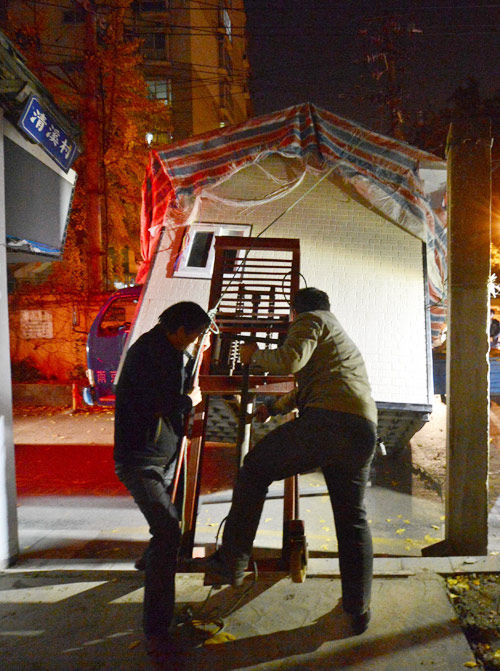News that Shenzhen will open its first "safe haven" for abandoned children early next year has raised public concern that the move will encourage parents to abandon their babies.
 |
|
Welfare personnel set up a portable room as safe haven for abandoned babies in Nanjing, on Nov 27. [Zhao Jie/for China Daily] |
Tang Rongsheng, director of the Shenzhen Welfare Center, said the facility's purpose will be to keep babies safe. Although the shelter cannot prevent parents from abandoning their children, the outcome will be different as the youngsters will receive protection.
The facility in Shenzhen, which will cost at least 150,000 yuan ($24,600), will be next to the welfare center's security booth. No surveillance camera will be installed around the safe haven to protect the parents' privacy.
Workers at the welfare home will be required to move babies from the safe haven to inside the welfare home as soon as possible.
Tang added that the number of abandoned children in Shenzhen in 2009 was 200, and the figure is about 90 so far this year.
Guangzhou Children's Social Welfare Home expects its safe haven for abandoned babies to go into operation by the end of January next year.
The haven is made of special material to create an environment, including warm temperatures and adequate ventilation, to make babies comfortable.
The 10-square-meter safe haven will have an incubator, a crib, beddings, an alarm, a ventilation fan, an air conditioner and an infrared intruder detector.
The first baby safe haven in China was launched in June 2011 in Shijiazhuang, Hebei province. The facility has taken in about 170 children, according to China National Radio.
The Ministry of Civil Affairs, along with six other departments, issued in May a notice on tightened management of baby abandonment.
The Shenzhen program is not without its critics, with some saying that people from surrounding areas will bring their unwanted babies to the city.
Shenzhen resident Lin Xin, 48, said that there will be more cases of child abandonment after the program because people will think that the local government now will take care of their problems.
"People should think carefully before they are going to have a baby. It is a responsibility," Lin said.
Liu Qinyuan, 45, a bank employee, said that program will not be satisfactory, given that public awareness needs to be improved.
"The government should invest more in helping parents raise their babies properly, or educate them to respect life," said Luo Chunchang, a man from Shenzhen.
Similar concerns about a possible increase in the number of abandoned babies have emerged in Jiangsu province, which will open its first safe haven in Nanjing by the end of this year.
Ma Yan, head of the social welfare department under the Nanjing Civil Affairs Bureau, said that the bureau had this concern before launching the booth program.
"The booth will be tested for one year to see whether its establishment will increase the number of abandoned babies," said Ma.
Zhu Hong, director of Nanjing Children's Welfare Institution, said that the booth will be east of the institute's door.
Zhu said that the booth will provide a shelter for abandoned vulnerable babies and save their lives. Another booth will be established in Xuzhou in 2014.
"More than 98 percent of the babies sent to the institute by police have severe physical or mental disabilities," Zhu said. "Many of them wouldn't have any chance to survive if they were not found by local residents by chance."
However, Yu Fangqiang, coordinator of Tianxiagong (Justice for All), a Nanjing-based NGO promoting welfare, benevolence and equality, said that a safe haven is a good place to start.
"From a legal perspective, this move is choosing the lesser of two evils. It is better than having babies left in the street, without any care."
Yu said that the baby haven concept will spread quickly in China because it is an easier and more convenient way to save abandoned babies.
However, he said that the new facilities are not enough to resolve the fundamental issue.
"All of society should work together to educate new parents that abandoning babies is illegal and immoral. NGOs and local governments should help them send unintended babies to the social welfare institute."
Contact the writers at cangwei@chinadaily.com.cn
Lin Baiyu in Shenzhen contributed to this story
|
|
|
|
|
|
|
|
